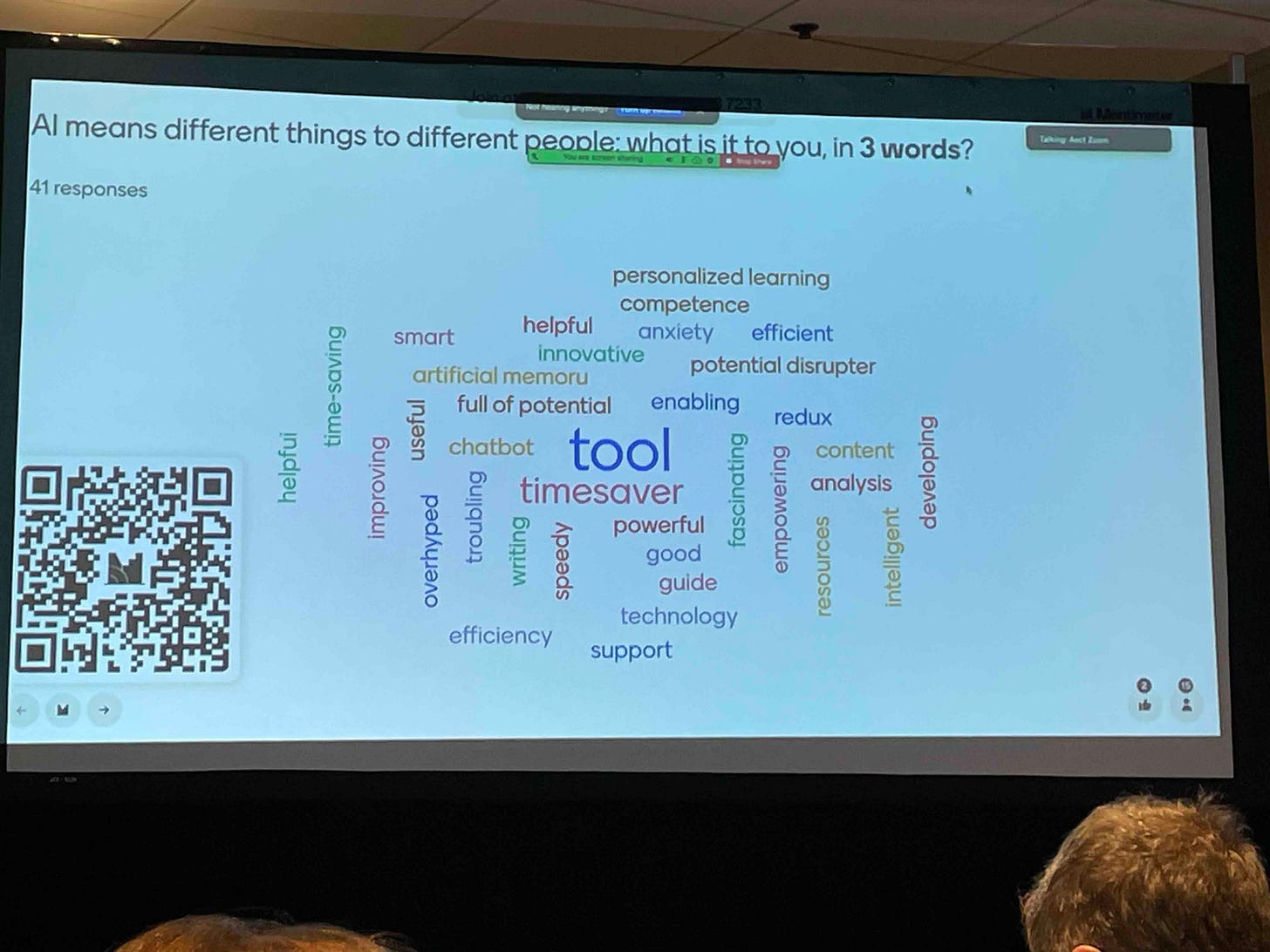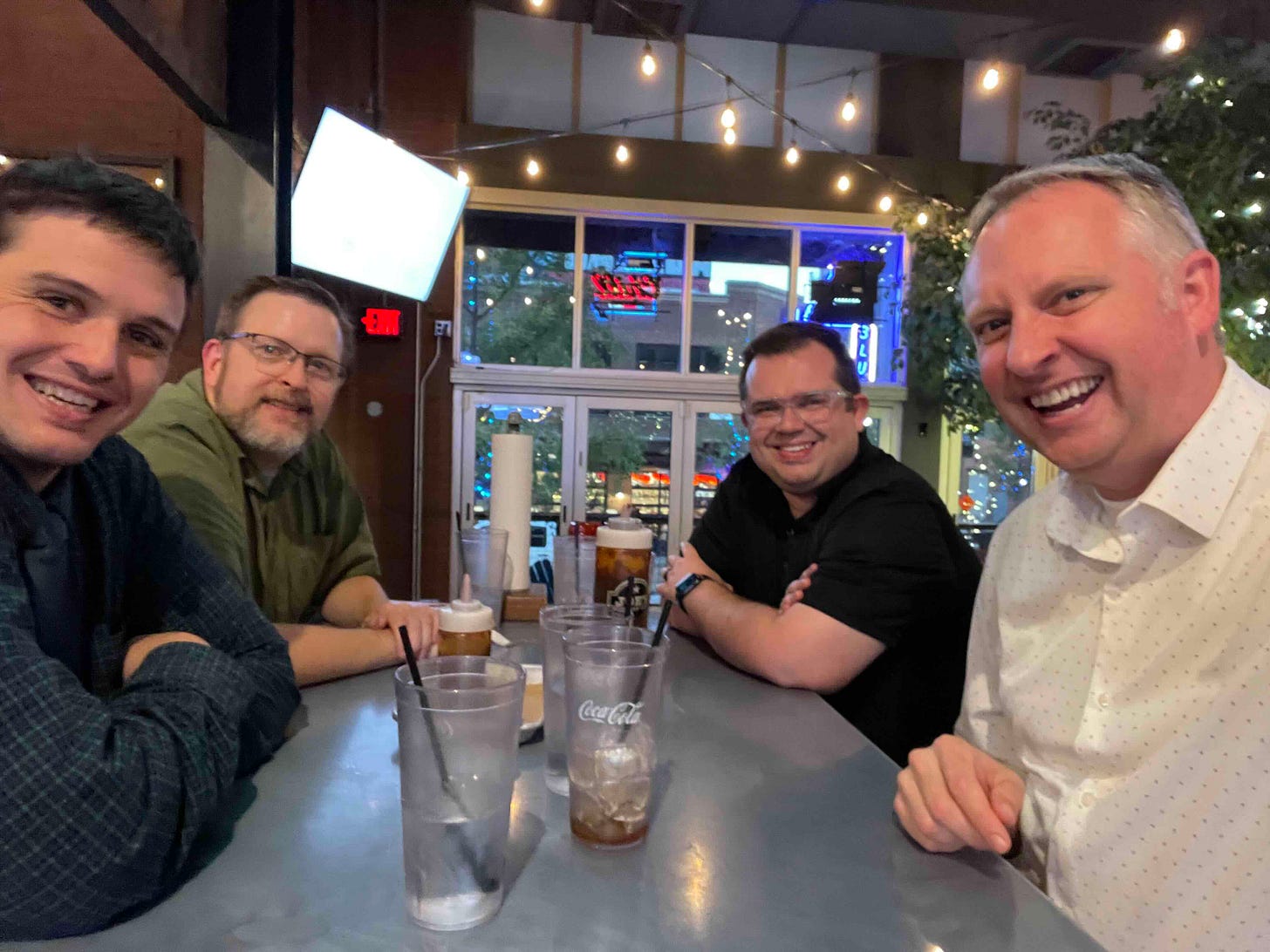Artificial Intelligence in Education
Things I've learned, and things I'm still thinking about, and things I wonder about what YOU are thinking about
It’s been a busy fall for me, and it’s not over yet! One of the joys of my fall was attending the annual convention of the Association of Educational Communications and Technology. AECT has become one of my professional homes; this organization is about 2000 fellow EdTech professors who conduct research in all sorts of interesting avenues related to educational technology. I joined AECT in 2014, and I’ve tried to attend the conference every year since then—I think I’ve only missed it twice in that time!

AECT is an academic conference, which is a little different from the other conferences I often attend. The main focus is presenting research that the attendees have been doing, and soliciting feedback from peers in the field. Many of the presentations shared at the conference wind up as papers in academic journals in the field. It’s a great opportunity for me to learn about cutting edge developments in my field, and to get to sit in sessions with luminaries in the academic side of the EdTech field.
Because I’ve been regularly attending—and presenting my own research—for years now, I’ve gotten to know some folks really well. These wonderful people have become good friends to me. I’ve had the privilege of co-presenting conference sessions with some of them, and writing articles and book chapters with some of them. And, of course we get to hang out in person for a few days, which is always fantastic!

The conference is always an interesting way for me to keep my finger on the pulse of where my field is at, in terms of the things people are currently researching. It’s probably no surprise to you that many of the sessions at AECT this year dealt in some way with artificial intelligence. I bet half the sessions had the terms “artificial intelligence,” “machine learning,” or “chatbots” in their titles in the program! (For the record, neither of the sessions I presented had anything to do with AI. But I suspect I might have a session next year related to issues with AI in education—it’s definitely the hot topic in my field right now!)
I had the opportunity to attend over half a dozen sessions about AI in education, which ran the range from AI generated feedback to students, to using AI for creating educational resources, to a case study of a professional development workshop to help demystify AI for PreK-12 teachers, to a panel discussion about ethical use of AI for both students and instructors alike. I think my favorite quote from the whole conference came in that panel discussion, where one of the presenters on the panel quipped, “We’re talking a lot about artificial intelligence…why is no one talking about artificial stupidity??” (He was getting at the idea that some studnets are trying to avoid the actual learning part of education by using AI…which is pretty stupid, honestly.) :-)
One of the most interesting sessions was entitled “How Artificial Intelligence will Reshape Education.” The presenters were trying to do some future-casting, which is always interesting—and a little dangerous in a field that evolves as quickly as EdTech. What made the session so intriguing to me was that they realized that this was a pretty “smart room” (basically everyone in the room has a PhD or is a doctoral student, yeah?) so they asked us to weigh in quite a bit as part of the session.
For example, recognizing that people hold many different views of AI—even in a professional guild, like AECT—they asked us to share three words we would use to describe AI. Here is what came out of that exercise:

The most common response was “tool”—which is very much how I see AI: a tool that can be used in constructive or destructive ways. I was also struck by how positive the general tone of the word cloud is, with words like useful, innovative, speedy, powerful, efficient, helpful, time-saving, personalized learning, and full-of-potential showing up in the list. Balancing these, there are also some more cautious additions, including troubling, anxiety, potential-disrupter, and over-hyped. That combination really matches the feel that was in the room as we discussed these results; we were not technophobes who fear that AI is out to take our jobs! But neither were we dewey-eyed optimists who think AI is the panacea that is going to save education. There was a healthy skepticism about what AI can actually do—for now, anyway—but also a curiosity, and an interest in developing expertise.
A little later in the session, the presenters invited us to share our perceptions of how AI is impacting different aspects of the world of education. Here were the results of that inquiry:

Interesting to me, the area where our collective wisdom saw the greatest impact (for today, at least) is dealing with administrative tasks: “automating routine tasks to allow teachers more time for instruction.” Honestly, this is how I’m most using AI in my own work today: creating summaries of lengthy passages, creating rubrics for assignments, generating first drafts of emails, and the like. In this query, the two areas that were rated lowest were educational equity and accessibility (“developing inclusive tools such as AI-powered digital textbooks”) and digital literacy (“equipping students with AI and tech-related skills for future employment.”) This really didn’t surprise me at this point.
But interestingly, as we discussed the results of this quick survey, one of the attendees pointed out that the things we see here are probably a very accurate reflection of the ways we are currently using AI, and that this isn’t necessarily the case that we won’t use AI in all of these ways in the future. I thought that was a great point…and I think we are just still early enough in the process of educators, researchers, and developers figuring out how to leverage AI that the places we are finding the most value probably are those more pragmatic uses.
Two of the phrases that kept coming up throughout the sessions I attended at AECT was “ethical implementation,” and “keep the human in the loop.” Both of these seem like important principles for “good” use of AI…but both are also ideas in need of more development, I think. It seems to me that these are big questions that many of the scholars I rubbed shoulders with at AECT are interested in pursuing. As a community, we EdTech researchers are good at asking questions! The good news: we also are pretty good at pursuing answers to those questions. And that’s where my attention is swinging now.
I’ve been thinking—and doing some writing—about AI already. In the last edition of this newsletter, I shared that I had a chapter published in a recent book by ACSI about AI in Education. The chapter I contributed is entitled, “A Biblical Framework for Understanding and Responding to AI.” And while I definitely want to help my fellow Christian educators think theologically and philosophically about AI in education, I’m wondering about whether some more practical tips and advice might also be helpful here?
I guess I’m just wondering about how you are feeling about AI, friends, and whether I might be able to provide some advice, equipping, and encouragement. Would that be a benefit for you?
Would you be willing to participate in a quick survey to help me determine if this is worth me dedicating some time and attention towards in the coming months on this newsletter? Here is a quick survey that will take you two minutes to complete: AI Interest Survey.
We are living in fascinating, strange times, friends. Grace and peace to you as we all navigate it together!
Dave’s Faves
Here are three things I’m absolutely loving right now that I hope you might love too…
Dave’s Fave #1: Kansas City BBQ!
Okay, I may have a problem. I was in Kansas City for three days for this conference, and I had BBQ three times. (Actually…maybe this isn’t a problem? Maybe I’m just doing it right!)
Dave’s Fave #2: Biking in October
It’s pretty fantastic to have the opportunity to keep pedaling all the way through to the end of October!
Dave’s Fave #3: Love & War & the Sea In Between
I’ve loved this album by Josh Garrels since the first time I heard it. This was part of the soundtrack for me writing my dissertation back in 2016/17, and I often find myself listening to it in the fall—it has an “autumn” sort of association in my mind somehow. I particularly love track #3 (Farther Along) but there is not a bad song on this album, in my humble opinion. Give it a listen, and then drop a comment to let me know what you think!
The Last Word!
My final thought for this edition of Positivity - Passion - Purpose: find yourself some friends in your field but not at your school. I learn SO MUCH from these friends! We have similar roles, and similar interests, but the contexts in which we serve are so different, there is a lot of opportunity to learn and grow, just by spending time together. Teaching is busy, challenging work, after all. But having friends that you can learn with and from helps give a little broader perspective!








Hi Dr. Dave! I just wanted to say that I shared this post with two of my colleagues here in Winnipeg. These are the two that help me navigate all things tech . . .and don't laugh at me too often. They are very interested in AI in education and recently one of them hosted a workshop at our yearly teachers' conference. So thanks for the info and the encouraging words!